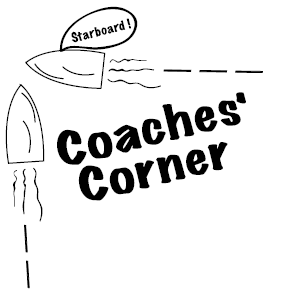by STEWART ARNOLD
The month of June is typically accompanied by the hustle and bustle of junior sailing program preparation. With all this being crammed into the last week or two, organization and planning for your program becomes crucial. Widespread confusion is not uncommon, and can reach everyone from instructors to parents and sailors. There are certain things we can all do as parents, sailors, instructors and program directors to reduce this confusion and start off the summer on the right tack!

Goals: For parents and sailors, this is easy to do. Sit down and talk about some of the things you hope to get out of your summer sailing. For parents, this is very important: Listen to your kids. They might not want to go out and sail every Green fleet regatta, or maybe they have a few regattas from a previous summer that were extra fun that they want to do. Realize what it is your kids are looking forward to in the summer sailing program, and help them be able to communicate it to their instructors.
As an instructor, it’s great to start the summer off with goals, so ask each class you teach to come up with a list of goals. Yes, even an eight-year-old can express what they want to do and learn in the summer. Encourage them by presenting some of your own objectives to work toward with the class such as, roll tacking for advanced classes or sail controls for beginner classes. These goals will help you to better formulate lesson plans as the summer goes on and will keep both you and the kids enthusiastic about each day of class.
Boat preparation and check-in day: This is perhaps one of the most important steps to take to make your junior program successful. For an instructor or sailor, nothing is more frustrating than a missing bailer from an Optimist or a broken machine block. These things delay class, frustrate kids and leave instructors doing boat work rather than teaching class. Everyone plays a role in preventing this from happening. For program directors, pick a day to allow for boat inspection before the start of a class. Have a clear check sheet that you make with your instructors with some help from your local small boat shop. Invite the shop to be there at your inspection day and encourage parents to buy any parts they need right then and there.
For instructors, it is important to be there for inspection day. Not only is it good to meet the parents (networking for your future), but you should go over as many boats as you can yourself, checking for what you find to be important.
Instructor and junior instructor training: For a program director and instructors, this is often one of the most important steps to having a smooth start. Instructor training should cover everything from lesson plans to running the coach boats. By the end of the training, each instructor should be able to safely operate each coach boat, and know the procedure to gas up each boat and put them away at the end of the day. Each coach boat should be equipped with a safety box containing some small essential tools and first aid supplies. Instructors should know which classes they will be teaching and have a basic lesson plan formulated. Similarly, Junior Instructors should have a day set aside where you discuss their responsibilities. Having good Junior Instructors can really facilitate a better learning environment for the sailors.
Regatta sign up: One of the struggles for instructors is often regatta morning. It can be hectic and frustrating with sailors showing up late, boats not gassed up, missing registration forms or no cash or check to pay the entry fee. Many of the big junior events in the summer, like Larchmont Race Week, have online registration that eases the burden on instructors. For your junior program, I would set up a regatta board with the dates and fees of all events for both parents and sailors to see. Set up an email system where parents RSVP with the program director or head instructor prior to the day of the event. This allows the instructor traveling with the sailors to have an up-to-date roster to use for attendance purposes prior to regatta departure or the start of racing.
Like all aspects of sailing, organization is often the key to success. With proper planning and forethought by parents, sailors and instructors, the summer can be filled with lots of smiles and fun rather than tears and headaches!
Taylor Walker of Madison, CT is a founding member of Team Chance, a new organization created to give young people an opportunity to race big boats (chancesailing.org). An interview with Taylor appears on page 44.



